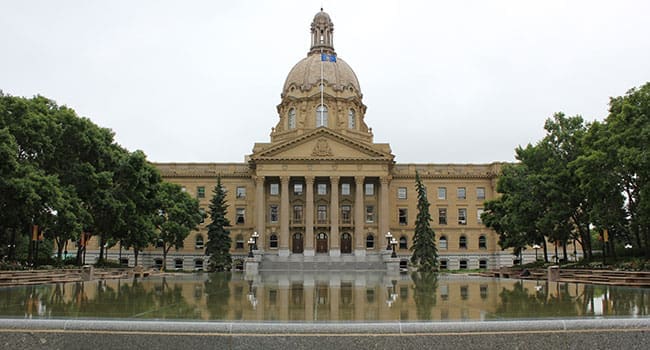 It’s no secret that, barring a sooner-than-expected and sustained upswing in oil prices, Alberta’s provincial government won’t have enough revenue to cover its expenditures next year. The shortfall could be as much as $7 billion.
It’s no secret that, barring a sooner-than-expected and sustained upswing in oil prices, Alberta’s provincial government won’t have enough revenue to cover its expenditures next year. The shortfall could be as much as $7 billion.
Does this mean that we have a revenue problem or a spending problem?
This is not a question with an easy answer. Sifting through the budget numbers, debating the merits of the flat tax and mulling over how best to finance infrastructure will not reveal the answer any more than praying for another oil boom.
Finding a truly satisfying answer comes down to asking a much deeper question: What role do we want our provincial government to play in our lives and our economy?
Do we want lots of government intervention in the economy or hardly any? Should we emphasize self-reliance or collective action? How much faith do we have in market solutions versus central planning? Are we doing enough to protect the most vulnerable among us? What are we willing to give up? Are there areas in which we should be spending more than we are?
For the most part, we’ve been able to sidestep this ideological hornet’s nest in Alberta by spending our resource wealth. Oil and gas royalties have enabled us to fund a relatively large amount of public spending at relatively low tax rates. We get “big” government and “small” government at the same time!
With the exception of the debate spurred by the Klein government’s spending cuts back in 1993, the conversation about the role of Alberta’s provincial government has tended to focus on individual budgetary trees rather than the fiscal forest. Examples include the debate about the wisdom of the Prosperity Bonus (a.k.a. Ralph Bucks), the battle over royalty rates, fears about the bitumen bubble, the cost of former Premier Alison Redford’s trip to South Africa and the “sky palace” scandal.
When things go really wrong and billion-dollar deficits form, we pray for higher oil prices and wait anxiously for things to get back to “normal.”
How we address the wild swings in our resource revenue, and the often ignored matter of how to steward our resource wealth so it can be enjoyed by future generations, are critical issues that deserve a thorough public debate.
But it doesn’t get at that deeper question: What role do we want our provincial government to play in our lives and our economy? This is more complex than how “big” or “small” we want our provincial government to be. We need to decide, for example, how we are going to fix our healthcare system, how to ensure our students have the skills they need to succeed in today’s world, how to plug the holes in our social safety net and how best to encourage economic development.
As long as we are fuzzy as a society about what we want from our government – how much we want it to be doing on our behalf versus how much we are willing and able to take on as individuals, businesses and communities – we will be equally fuzzy about what directions to take on specific issues such as a new tax or the cutting of a particular social program.
As we engage with one another on this, we will see that it’s not just about finding a way to balance the budget. It’s about what we are trying to achieve when we raise and spend public dollars and whether or not that spending is the best way to get there.
With a provincial election on the horizon, now is the time for Albertans to dig into this deeper question. We need to step back from the debate about how to fill the current fiscal hole and ask ourselves what kind of society we want and how government can, and can’t, help us achieve it. We need to see this as an opportunity rather than a burden.
Robert Roach is a Senior Analyst with ATB Financial’s Economics and Research Team. The opinions expressed in this column are his own.
Robert is a Troy Media contributor. Why aren’t you?
The views, opinions and positions expressed by columnists and contributors are the author’s alone. They do not inherently or expressly reflect the views, opinions and/or positions of our publication.


